Top Rankings
Milford School District ranks among the top 20% of public school district in Nebraska for:
Category
Attribute
Reading/Language Arts Proficiency
Highest reading/language arts proficiency (Top 20%)
Graduation Rate
Highest graduation rate (Top 5%)
For the 2025 school year, there are 2 public schools serving 803 students in Milford School District. This district's average testing ranking is 9/10, which is in the top 20% of public schools in Nebraska.
Public Schools in Milford School District have an average math proficiency score of 58% (versus the Nebraska public school average of 46%), and reading proficiency score of 57% (versus the 47% statewide average).
Minority enrollment is 8% of the student body (majority Hispanic), which is less than the Nebraska public school average of 38% (majority Hispanic).
Overview
This School District
This State (NE)
# Schools
2 Schools
1,100 Schools
# Students
803 Students
328,496 Students
# Teachers
63 Teachers
24,032 Teachers
Student : Teacher Ratio
13:1
13:1
District Rank
Milford School District, which is ranked within the top 20% of all 245 school districts in Nebraska (based off of combined math and reading proficiency testing data) for the 2021-2022 school year.
The school district's graduation rate of 95% has increased from 90% over five school years.
Overall District Rank
#51 out of 246 school districts
(Top 30%)
(Top 30%)
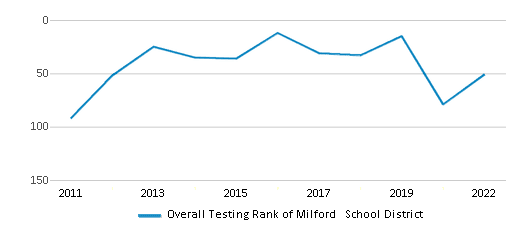
Math Test Scores (% Proficient)
57%
46%
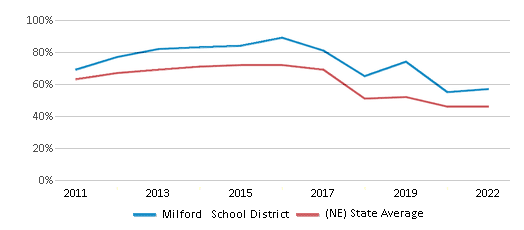
Reading/Language Arts Test Scores (% Proficient)
57%
47%
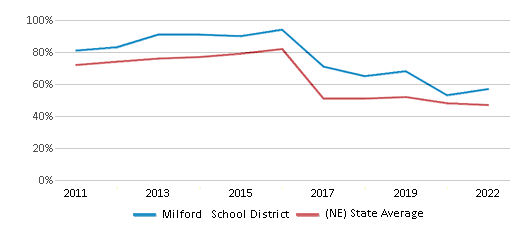
Science Test Scores (% Proficient)
70-74%
62%
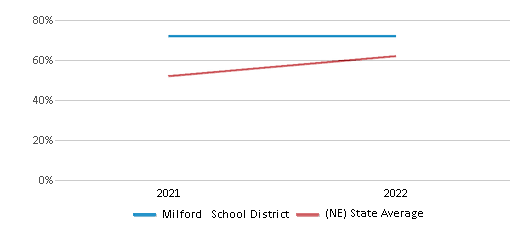
Graduation Rate
≥95%
87%
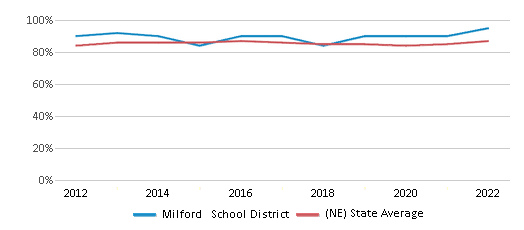
Students by Ethnicity:
Diversity Score
0.15
0.57
# American Indian Students
7 Students
4,353 Students
% American Indian Students
1%
1%
# Asian Students
6 Students
10,108 Students
% Asian Students
1%
3%
# Hispanic Students
32 Students
73,597 Students
% Hispanic Students
4%
22%
# Black Students
11 Students
21,317 Students
% Black Students
1%
7%
# White Students
739 Students
203,278 Students
% White Students
92%
62%
# Hawaiian Students
n/a
560 Students
% Hawaiian Students
n/a
n/a
# Two or more races Students
8 Students
15,283 Students
% of Two or more races Students
1%
5%
Students by Grade:
# Students in PK Grade:
36
19,504
# Students in K Grade:
45
22,318
# Students in 1st Grade:
50
22,898
# Students in 2nd Grade:
60
23,457
# Students in 3rd Grade:
59
23,201
# Students in 4th Grade:
56
23,506
# Students in 5th Grade:
59
23,198
# Students in 6th Grade:
62
23,396
# Students in 7th Grade:
73
23,395
# Students in 8th Grade:
61
24,061
# Students in 9th Grade:
76
25,222
# Students in 10th Grade:
65
25,356
# Students in 11th Grade:
53
23,606
# Students in 12th Grade:
48
25,378
# Ungraded Students:
-
-
District Revenue and Spending
The revenue/student of $12,598 in this school district is less than the state median of $15,464. The school district revenue/student has stayed relatively flat over four school years.
The school district's spending/student of $12,386 is less than the state median of $16,776. The school district spending/student has stayed relatively flat over four school years.
Total Revenue
$10 MM
$5,080 MM
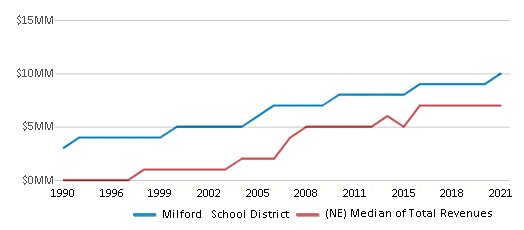
Spending
$10 MM
$5,511 MM
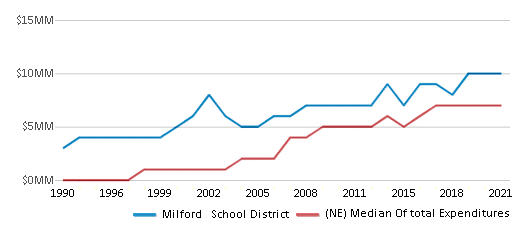
Revenue / Student
$12,598
$15,464
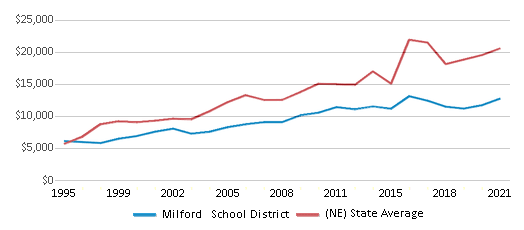
Spending / Student
$12,386
$16,776
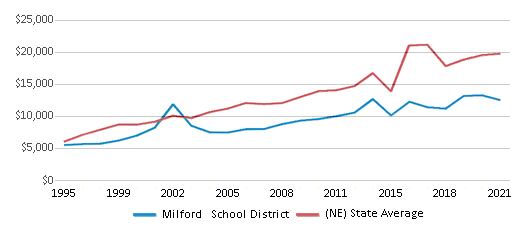
Best Milford School District Public Schools (2025)
School
(Math and Reading Proficiency)
(Math and Reading Proficiency)
Location
Grades
Students
Rank: #11.
Milford Elementary School
(Math: 59% | Reading: 57%)
Rank:
Rank:
8/
Top 30%10
1200 West 1st Street
Milford, NE 68405
(402) 761-2408
Milford, NE 68405
(402) 761-2408
Grades: PK-6
| 427 students
Rank: #22.
Milford High School
(Math: 55-59% | Reading: 55-59%)
Rank:
Rank:
8/
Top 30%10
301 G Street
Milford, NE 68405
(402) 761-2525
Milford, NE 68405
(402) 761-2525
Grades: 7-12
| 376 students
Frequently Asked Questions
How many schools belong to Milford School District?
Milford School District manages 2 public schools serving 803 students.
What is the rank of Milford School District?
Milford School District is ranked #46 out of 245 school districts in Nebraska (top 20%) based off of combined math and reading proficiency testing data for the 2021-2022 school year. This district ranks in the top 20% of Nebraska school districts for: Highest reading/language arts proficiency (Top 20%) and Highest graduation rate (Top 5%)
What is the racial composition of students in Milford School District?
92% of Milford School District students are White, 4% of students are Hispanic, 1% of students are American Indian, 1% of students are Asian, 1% of students are Black, and 1% of students are Two or more races.
What is the student/teacher ratio of Milford School District?
Milford School District has a student/teacher ratio of 13:1, which is lower than the Nebraska state average of 14:1.
What is Milford School District's spending/student ratio?
The school district's spending/student of $12,386 is less than the state median of $16,776. The school district spending/student has stayed relatively flat over four school years.
Recent Articles

Year-Round Or Traditional Schedule?
Which is more appropriate for your child? A year-round attendance schedule or traditional schedule? We look at the pros and cons.

Why You Should Encourage Your Child to Join a Sports Team
Participating in team sports has a great many benefits for children, there is no doubt. In this article you will learn what those benefits are.

White Students are Now the Minority in U.S. Public Schools
Increasing birth rates among immigrant families from Asia and Central and South America, combined with lower birth rates among white families, means that for the first time in history, public school students in the United States are majority-minority. This shift in demographics poses difficulties for schools as they work to accommodate children of varying language abilities and socio-economic backgrounds.





